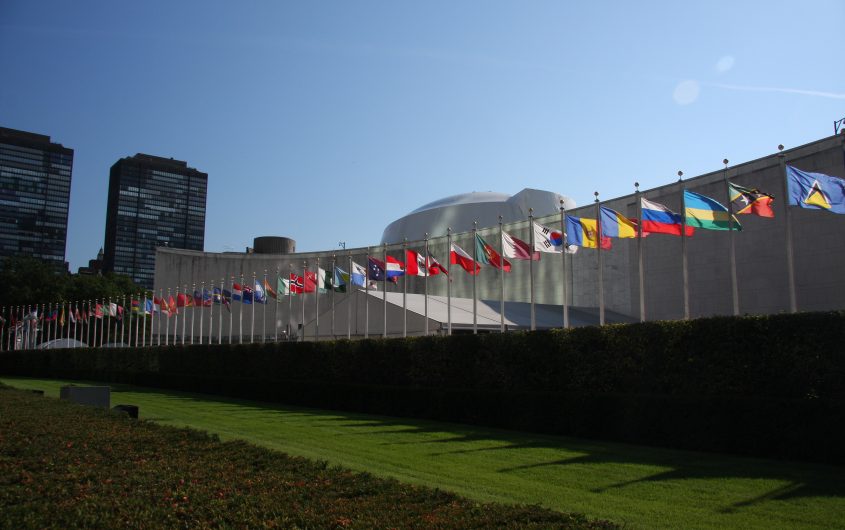
The Fate of Multilateralism: Can Civil Society Come to the Rescue?

Danielle Piatkiewicz
The German Marshall Fund of the United States
Danielle Piatkiewicz is a program coordinator for The German Marshall Fund of the United States’ (GMF) Asia and the Future of Geopolitics program. In these roles, she is responsible for managing and coordinating the Asia program’s portfolio on U.S. and EU relations with China, Japan, and India on economic, trade, security, and defense issues. In addition, she manages the Future of Geopolitics program which examines the emerging challenges to the liberal international order through convening and research to explain current political and societal trends in the United States to a Europe. She works on various leadership development projects at GMF including organizing the Young Professionals Summit at GMF’s flagship event, the Brussels Forum, and the Emerging Leaders program at Atlantic Dialogues.
Previously, she worked as a program assistant in GMF’s Wider Atlantic program in Brussels and program intern in Warsaw. Before joining GMF, she worked for the European Institute of Peace in Brussels (EIP) where she assisted with the logistical and operational set up of EIP as well as provided research and analysis on future peace mediation actors and regions. She holds an MA in international and political studies with a concentration in transatlantic studies from Jagiellonian University in Krakow, Poland. She received her BA in political science with an emphasis in international relations and a minor in German studies from the University of California, Santa Barbara (UCSB).
She is a 2018-2019 participant in AICGS’ project “A German-American Dialogue of the Next Generation: Global Responsibility, Joint Engagement,” sponsored by the Transatlantik-Programm der Bundesrepublik Deutschland aus Mitteln des European Recovery Program (ERP) des Bundesministeriums für Wirtschaft und Energie (BMWi).
Since the end of World War II, international cooperation has led to decades of unprecedented progress. From interconnected markets to the exchange of ideas and innovation, multilateral collaboration has set the rules and standards required to tackle new emerging global challenges. Traditionally led by the United States and Europe, multilateralism has been supported by systems of collective cooperation aimed at setting the international principles that govern today’s rules-based order.
However, it seems that after every high-stakes global meeting—from the G7, to the NATO summit, to the latest UN general assembly—the U.S. retreats further while the EU becomes more divided, impeding their joint approaches toward multilateralism. While there are many contributing factors leading to this new reality, in general, the U.S. and the EU have struggled to communicate their policies effectively both domestically and abroad. This lack of clarity has intensified the continual rise of populism, anti-globalization rhetoric, and isolationist policies on both sides of the Atlantic.
The Transatlantic Struggle
If multilateralism has any chance, the U.S. needs to come to terms on how to best deal with and convey its view toward international agreements. President Trump’s “America first” approach has been dominated by a quid-pro-quo mentality focused on making the best “deal,” leading to a flood of bilateral agreements. By challenging the nuclear deal with Iran, the Paris climate agreement, and multilateral trade deals like TTIP, TPP, NAFTA, and very recently the IMF, the U.S. administration continues to send mixed signals to a divided public and international partners on where it stands in the global arena.
The EU has been a longtime champion of multilateral institutions but has been dealing with its own share of internal disputes, which have weakened its united approach to regional and global issues. This lack of unity has led to further fractures within Europe, causing anti-globalization narratives across a broad set of issues including trade, security, climate change, and the future the European Union. It has also buttressed there a turn of populist ideology and democratic backsliding that challenge the multilateral system.
On the other hand, while the EU itself struggles to find its united voice, some EU countries are unilaterally and bilaterally taking the lead on defending multilateralism. Following Germany’s election to a two-year term on the UN Security Council, Germany, along with France, has recently agreed to stand together to defend the rules-based global order. Keeping in mind their common approach toward universal human rights, peace, security, and the rule of law, they have pledged to work toward achieving UN-led political solutions for global conflicts. Multilateral structures like the UN actively promote cooperation with civic actors—especially at the sidelines of world summits—but there is still a need for sovereign states to support and engage civil society organizations (CSOs) more effectively.
Emerging Challengers
As the transatlantic partners grapple with their approaches, emerging global players such as Japan, India, and even China are pledging to protect multilateralism and are stepping up to contribute to the global rules-based order—with or without the traditional support of the U.S. or the EU. Supported by its increasing influence in existing multilateral organizations, growing military presence, and strong economic growth, China continues to be well-positioned to take a role as global leader while reforming the rules to fit its needs. India and Japan, on the other hand, prefer to uphold and work within the current order. Yet, they still rely on strong transatlantic support.
Without a strong advocate, it remains to be seen whether the current U.S. and EU-led liberal order and existing multilateral organizations can adapt to survive, be replaced, or become obsolete without unequivocal support.
The Structure Exists, Let’s Use It
Initially created by sovereign states, civil society entities have long worked with nations to establish, endorse, and challenge some of the first international institutions: from the Bretton Woods Agreement to the United Nations, World Trade Organization and NATO. CSOs have provided a platform and a collective narrative to help resolve global problems by engaging experts and stakeholders to better inform and influence societal development.
CSOs have stepped up to defend existing multilateral agreements, demonstrating that they are still vital in securing and helping to drive today’s liberal order. For example, as the U.S. withdraws support from the global stage, it has provoked a backlash from organizations and campaigns aimed at challenging some of the more contested aspects of globalization. For example, after the U.S. withdrawal from the Paris climate agreement, CSOs promoted state-led initiatives and supported other nations in adapting the proposed climate targets—despite President Trump’s negative rhetoric and proposed budget cuts toward the civil society community abroad.
As the world continues to confront unparalleled global challenges, a strong rules-based order supported by multilateral institutions to monitor and govern global actors is critical. The U.S. and individual nations like Germany are examples of countries that can take a stronger role on safeguarding multilateralism. To further garner political support internally and globally, CSOs are a proven platform in creating effective measures to bolster continued support and ensure transparency and accountability.
If active steps are not taken to secure the survival of the multilateral order, the West will need to be prepared for emerging challengers to take a stronger lead.









